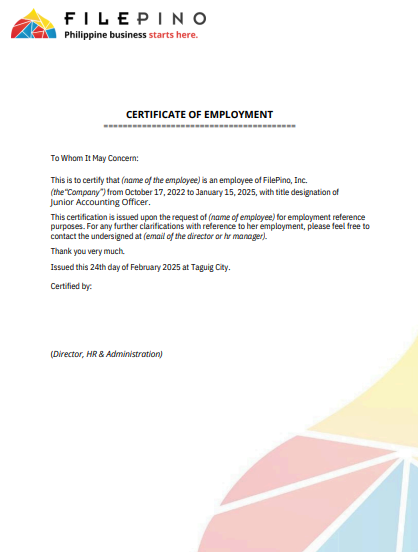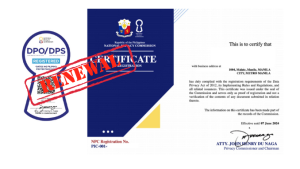A Certificate of Employment (COE) is a vital document that verifies an individual’s employment history with a specific employer. It includes crucial details such as the employee’s position, employment duration, salary, and other relevant work information. This document is commonly requested by potential employers, financial institutions, government agencies, and immigration offices to confirm an individual’s employment status and income.
The COE is essential for various applications, including job applications, loan applications, tax assessments, social security benefits, unemployment claims, and visa or residency applications. Employees can typically request a COE from their employer’s human resource department or a designated personnel officer. While employers are generally obligated to provide a COE upon request, there might be instances where they refuse, and employees may need to seek legal advice or assistance from relevant government agencies. Understanding the importance of a COE and knowing how to request one can help employees manage their professional and personal affairs effectively.
What is a Certificate of Employment (COE)?
A Certificate of Employment is a formal document issued by an employer that confirms an individual’s employment status, job title, and tenure within the company. It may also include other details such as salary, responsibilities, and reason for separation (if applicable).
Key Features of a COE:
- Confirms an employee’s work history with a specific company.
- Does not always include salary details unless requested.
- Typically contains the employee’s name, job position, period of employment, and employer’s name.
- Must be requested by the employee and provided by the employer within a reasonable time.
- Can be used for various legal and administrative purposes.
Why is a Certificate of Employment Important?
A COE is crucial for various reasons, including employment verification, financial transactions, and immigration requirements. Below are some of the primary uses of a Certificate of Employment:
- Job Applications
When applying for a new job, potential employers often require a Certificate of Employment (COE) from previous employers. This document serves as tangible proof of the applicant’s work experience, outlining the duration of employment, job title, and responsibilities held. By verifying this information, employers can assess whether the applicant’s background aligns with the requirements of the open position.
- Loan and Credit Applications
Financial institutions, such as banks and lending companies, frequently request a COE when individuals apply for loans, mortgages, or credit cards. The COE acts as a crucial document in establishing the applicant’s financial stability. It demonstrates a consistent income stream and employment history, assuring the lender that the applicant has the means to repay the borrowed funds.
- Visa and Immigration Requirements
For individuals seeking visas or immigration status, a COE can be a mandatory requirement. Immigration authorities often use the COE to evaluate the applicant’s employment stability and financial capability. It serves as evidence that the applicant has a legitimate job and sufficient income to support themselves in the foreign country, reducing the risk of becoming a financial burden on the state.
- Government Transactions
Government agencies may request a COE for various purposes, including processing benefit applications or pension claims. The COE helps verify the individual’s employment history and income, ensuring that they meet the eligibility criteria for the specific government program or benefit.
- Rental and Lease Agreements
When renting or leasing a property, landlords and property managers may require a COE from prospective tenants. This document provides assurance that the tenant has a stable source of income and is capable of fulfilling the financial obligations of the lease agreement. By verifying employment and income, landlords can mitigate the risk of rental payment defaults and potential evictions.
Who is Entitled to Request a COE?
In accordance with Philippine labor laws, specifically the Labor Code of the Philippines, all current and former employees have the legal right to request a Certificate of Employment (COE) from their employers. This provision ensures that employees have proper documentation of their employment history, which can be crucial for various purposes such as seeking new employment opportunities, applying for loans, or processing visa applications.
The right to request a COE is a fundamental labor right in the Philippines, and employers are obligated to comply with this provision. Failure to do so can result in legal consequences for the employer.
Legal Basis
DOLE Labor Advisory No. 06, Series of 2020 mandates that employers must issue a Certificate of Employment (COE) to any employee who requests it. This certificate must adhere to specific guidelines and only include factual information about the employee’s employment history with the company. This includes details such as dates of employment, job title, and salary, while excluding any subjective opinions or evaluations of the employee’s performance.
Important Notes:
- Employers cannot deny a request for a COE, regardless of the reason for separation (resigned, terminated, retired, etc.).
- The COE should not contain negative remarks or any defamatory statements about the employee.
- The employer must release the COE within a reasonable period, typically within 3 to 7 working days.
What Information is Included in a COE?
A standard Certificate of Employment should contain the following information:
Essential Components of a Certificate of Employment (COE)
- Employee’s Full Name: This includes the first name, middle name (if applicable), and last name as it appears on official company records.
- Job Title/Position: The specific job title or position held by the employee within the company.
- Duration of Employment: The start date and end date of the employee’s employment period. If the employee is still currently employed, the end date may be left blank or marked as “Present.”
- Company Name and Address: The legal name and registered address of the company where the employee worked.
- Employer’s Contact Information: This typically includes the name, job title, and contact details (phone number and email address) of the authorized company representative who issued the COE.
- Company Letterhead and Authorized Signature: The COE should be printed on official company letterhead and signed by an authorized representative of the company, such as an HR manager or company director.
Additional Information (Optional, depending on company policy and/or employee request)
- Employee’s Salary: This may be included if requested by the employee or required by the receiving party (e.g., for visa applications or loan approvals).
- Reason for Leaving: This may be included if requested by the employee or required by the receiving party. It should state the reason for the termination of employment (e.g., resignation, termination, end of contract) in a clear and concise manner.
Remember: The specific requirements for a COE may vary depending on the company’s internal policies, the purpose of the certificate, and the country or jurisdiction where it will be used. It’s always advisable to check with the relevant authorities or receiving parties to confirm the necessary information and format.
Sample Template of Certificate of Employment (COE)

How is COE different from clearance?
A Certificate of Employment (COE) and a clearance are both employer-issued documents, but they differ in purpose and content. A COE verifies an employee’s work history, including position, employment dates, and sometimes salary, and is often needed for job applications, visas, loans, or government benefits.
In contrast, a clearance is issued upon resignation or termination, confirming that the employee has met all obligations to the company, such as returning property and settling accounts. While a COE can be requested anytime by current or former employees, a clearance is typically issued only upon employment separation.
How to Request a Certificate of Employment (Step-by-Step Guide)
Step 1: Check Your Company’s Policy
Before making a request, check your employer’s policy on COE issuance. Some companies have a designated HR department handling COE requests, while smaller businesses may require employees to reach out directly to management.
Step 2: Prepare Your Request
Most companies require a formal request for a COE. This can be done through:
- A written letter (handwritten or printed)
- An email request to the HR department
- An online portal or HR system (for companies with digital HR management)
Step 3: Submit the Request
When submitting your request, be sure to include the following details:
- Your full name (as recorded in company files)
- Job position and department
- Duration of employment
- Purpose of request (optional)
- Deadline (if applicable)
Step 4: Follow Up If Necessary
If you do not receive a response within the expected timeframe, you may follow up with HR or your manager.
Step 5: Receive Your COE
Once your COE is ready, it will be provided either physically (printed copy) or digitally (PDF or email attachment). Ensure that all details are accurate before using it for your intended purpose.
What to Do If Your Employer Refuses to Issue a COE
While it is rare, some employers may refuse to provide a COE despite the legal obligation to do so. Here’s what you can do:
1. Politely Follow Up
If your request is ignored, send a formal follow-up email or approach HR directly.
2. Refer to DOLE Regulations
Remind your employer of DOLE Labor Advisory No. 06, Series of 2020, which states that all employees are entitled to a COE.
3. Seek Assistance from DOLE
If the employer still refuses, you can file a complaint with the Department of Labor and Employment (DOLE) by visiting the nearest DOLE regional office or filing online.
A Certificate of Employment (COE) is a crucial document that serves multiple professional and personal purposes. Understanding its importance, how to request one, and what to do if an employer refuses to issue it can help employees exercise their rights effectively. By following the proper process and being aware of labor laws, you can ensure that obtaining a COE is a smooth and hassle-free experience.
If you need further assistance in employment-related matters, consider reaching out to DOLE or seeking guidance from a legal professional.
… and you might just need our assistance.
At FilePino, we ensure our team stays updated with the latest rules and regulations governing business compliance across various government agencies. We also leverage our extensive experience and expertise in navigating the intricacies of transactions.
Do you have questions about requesting a Certificate of Employment or other HR concerns? Set up a consultation with FilePino today! Call us at (02) 8478-5826 (landline) and 0917 892 2337 (mobile) or send an email to info@filepino.com.









